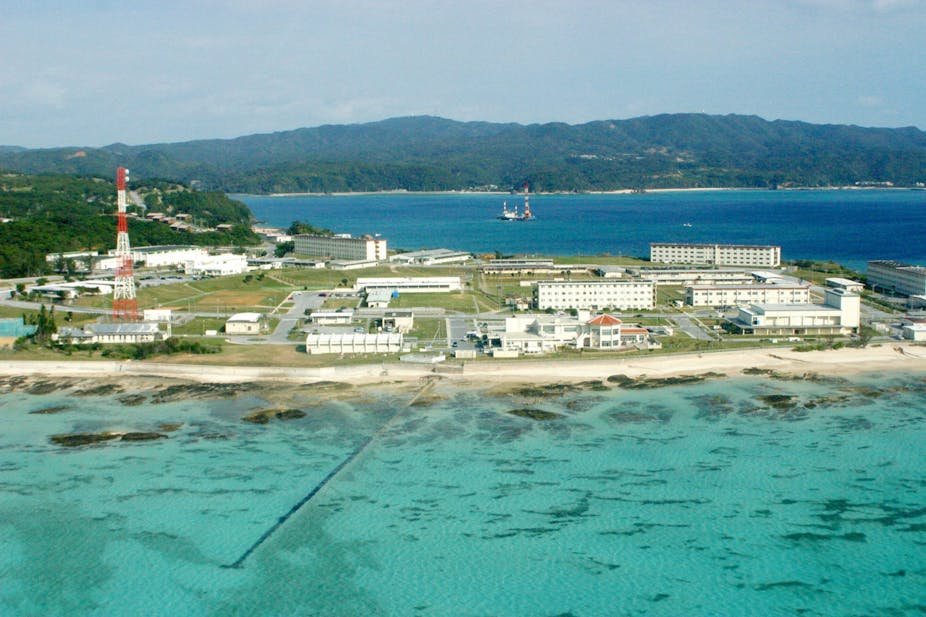Uncle Sam’s military presence in Australia is greater now than ever, and more is on the way. The hundreds of Marines rotational in Darwin since April will grow to 2,500 by 2016, bringing with them more ships, aircrafts and deadly weapons (e.g. cluster bombs).
This builds upon America’s most important surveillance station Pine Gap that taps into communication from Asia to Middle East, and Talisman Sabre, an all-out US-Australia biennial joint military training event at the foot of the Great Barrier Reef ongoing since 2007.
Future plans in a Center for Strategic and International (CSIS) report submitted to the US Congress in July include the basing of a US nuclear powered navy carrier group in HMAS Stirling Harbour (Western Australia) and a “drone” base on the Cocos (Keeling) Islands.
Without knowing, Australia could become a new US “keystone of the Pacific”: a name given to Okinawa – a Japanese territory and a US legacy base won in World War II, located northeast of Taiwan.
What is the purpose of the US military presence in Australia, and what does it mean for people on the ground? Until now, most public debate has focused on the first question; whether the presence will be good for Australia, especially that it may be harmful for our relations with China.
Not much is said about how it will impact local people. On this subject, we can learn much from the people’s dealings with the US military presence (especially Marines) on Okinawa. For decades, even when they threaten the right to autonomy and a peaceful existence of the hosting community, the US military’s extraterritorial privileges have given first priority to protecting their personnel and ability to conduct operations.
I have studied the Okinawan people’s protest, documented in a book Myth, Protest and Struggle in Okinawa.
It is all in the details – in Okinawa if you’re hit by a motor vehicle driven by US military personnel on civilian roads you are not protected by local traffic laws or insurance schemes. The Status of Forces Agreement (SOFA) exempts on-duty US military members from application of local criminal or civil jurisdiction. In October 2012, a local woman in central Okinawa was raped by two US navy soldiers on her way home from work.
In November, violating the post-rape curfew imposed on the US military members, a drunken Kadena Air Force serviceman trespassed into the family flat assaulting a 13-year-old boy, following this a US Marine officer found in a local residence sleeping after drinking.
There are countless other cases where perpetrators were dealt with exclusively by the US military, out of reach of Japanese authorities. In some cases that meant escape back to the US, with their fate unknown to the victims and their families. It is after these seemingly mundane daily incidents that locals come to realise they are living in a US military colony.
Due to the SOFA privileges that often allows US military perpetrators to escape local law and order, rape in Okinawa by US military members transcends the individuals’ traumatic experience, becoming a political outrage. The lesson for Australia is this: even if US military training and operations cause fatal harm to the locals, the US is not responsible.

What does this mean for Australia? Australia also has a SOFA with the US, written in 1963: according to Article 8, “US military authorities” has primary jurisdiction over offences in Australia committed during “official duty” (leaving room for arbitrary interpretation); even with local primary jurisdiction, the custody of a US military personnel remains in the hands of the US authorities until officially charged (leaving room for escape).
The Marines in Darwin belong to one of four rotational Marine Air Ground Task Forces (MAGTF) the US is now stationing across the Western Pacific: Okinawa, Guam, Hawaii and Australia. Note here that apart from Australia, all three of them have a history of being US or Japanese colonies. In all three places, indigenous people continue to fight for self-determination denied to them by US militarism.
It’s no coincidence that Guam’s collective will to become a Commonwealth, introduced as a bill in the 1980s after a series of referendums, has been ignored in the US Congress. Guam remains “unincorporated territory” without formal political representation in the US, providing the military freedom to conduct operations unhindered by local opposition.
Should Australians be thankful that the US military presence is providing strategic stability in Australia and the nearby region? It is more that Uncle Sam is thankful to Australians. His bases have been ousted from Ecuador (in 2009) and the Philippines (in 1991). Maintaining US forward defence capabilities overseas depends on the “political sustainability” of their presence (as the CSIS report put it): meaning that it depends on overseas communities who allow US extraterritorial privileges, sacrificing the wishes of those attempting to build a safe and humane space for living.
Now that they’re here, Australians could learn much from the experience of the Okinawans, who have been living with a foreign military presence for a long time and are saying “no” to it, shaking up the US-Japan alliance.

